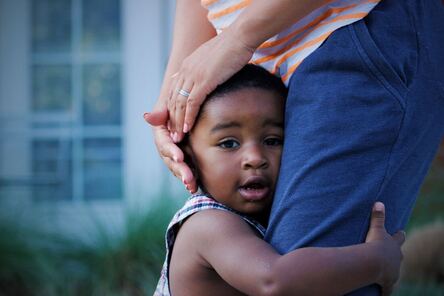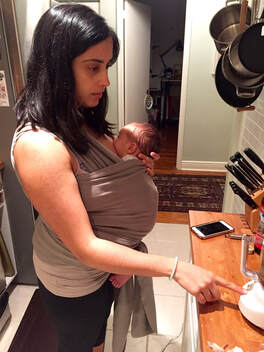|
One of the most common reasons that families reach out to me for consultations is to help them sort out their toddler's behavior. In these conversations there are some phrases that come up time and again. One of these is "It just comes out of nowhere." Or similarly, "It happens for no reason." I understand the feeling. Toddlers' reactions can often seem disconnected from the immediate cause. The intensity doesn't always match the perceived trigger. And to top it off, young children are generally not equipped to tell us why they felt the need to to throw themselves on the floor so dramatically when you suggested they put on their socks.
You might hear an "I don't like those socks!" but I have yet to come across a two-year-old who can express, "Well, I'm feeling ambivalent about going to daycare. I want to see my friends AND I'm sad to say goodbye to you. Sometimes it feels like a long time without you. As soon as my shoes are on I know we're on our way, so yeah... I don't really want to put on my socks." The thing is there is always something behind the behavior. Children's behavior is one of their primary forms of expression. The challenge for us as parents or educators is understanding what is being communicated. What need are they trying to meet? A very typical approach to dealing with unwanted behaviors is to focus on the behavior itself. Some families come to me having tried positive reinforcement techniques (praising desired behavior). Others have tried consequences or punishment to discourage unwanted behaviors. Most families I speak with have tried some combination of the two. These approaches are grounded in behaviorist theories of development. Behaviorist approaches aim to shape behavior. If they address underlying reasons, they do so only indirectly. In general, I find that at best they are effective only in the short-term. In response to these methods, the original behavior may morph into something else that looks very different, giving us the sense that the intervention worked when in reality the need is still being expressed. For example, a child may stop relying on hitting to communicate discomfort around a new sibling, but will seek to express their emotional needs through a newly challenging bedtime. The sleep disruption may then seem to "come out of nowhere," when in reality it is still tied to the feelings that led to the hitting in the first place. A different approach, the one I use with families and the one that current research in neuroscience and development supports, is to focus on understanding and addressing the needs behind the behavior. If their needs are met, the child no longer has to rely exclusively on unexpected or challenging behaviors to express themselves. It's not that these will suddenly disappear (a toddler is still a toddler), but they will fall away more easily without necessarily hardening into stubborn patterns. Even better, by seeking to address root causes, you will be strengthening your relationship with your child and growing everyone's capacity for empathy. Sometimes, stepping back to find the space and perspective to understand what is really going on with our toddlers can be hard. It can help to know about child development and common challenges at various points in development. It can help to put ourselves in our child's shoes for a moment and remember that when so much of your experience is new and few things are within your control, changes like a move to a big kid bed can be confusing and a big deal. And it can help to have someone who gets it to talk things through with. I am a big fan of using mantras as a parent. The right mantra has the power to bring focus and awareness to a moment that has almost gotten away from me. It can help me quiet the static in my head so that I am able to respond to my child sensitively rather than reacting from a place of frustration, misunderstanding, or disconnect.
A good mantra is one that speaks to you. It should be simple and easy to remember. It could be a sound to bring you back into yourself. It could be a word that reminds you to "breathe" or "wait." It could even be a phrase that reminds you of an important truth and brings perspective to a moment. One of my recent favorite mantras is Michelle Obama's famous phrase: "When they go low, we go high." There are several reasons why I find this an effective phrase to call up. First of all, I find that calling it up in the face of a negotiation with a determined toddler makes me laugh. Humor helps me find some space in the situation and I am able to breathe a little easier. It also gives me an instant perspective--the gravity of the low that Michelle was referring to reminds me that however big a conflict with a toddler can seem, I am more than equipped to handle it. Most importantly it reminds me of a truth about development. Our prefrontal cortex (the outermost, frontal part of the brain) does not finish developing until the mid-late twenties. This "highest" part of the brain is responsible for executive functions including: -reason & logic -planning -problem solving -impulse control -emotional-regulation -perspective taking It is the part of the brain we are relying on as adults when we have had a long day and our commute home gets extended. Here in NYC I see it on the subway. Delays are announced and folks have all kinds of "high brain" strategies for dealing with the frustration. Breathing, distracting themselves with reading or a phone, shifting back and forth, walking to the other end of the train, sighing, sharing the frustration with another commuter. Toddlers, no matter how precocious, do not have the full range of access to these abilities that we do as adults. Even as adults, depending on our level of stress, our childhood experiences, our emotional state, past trauma, and other factors, we are not always able to rely on our prefrontal cortex to regulate how we respond to a given situation. In the subway example, I notice this in my own increasing desire to let out a frustrated scream. So toddlers, especially emotionally overwhelmed toddlers, are operating from a deeper or "lower" part of the brain that is instinctive and impossible for them to rationally control. There is no conscious manipulation. There is no intent to hurt or anger. When confronted with a toddler who is "going low" our responsibility is to "go high." This means that we, who have access to reason, understanding and perspective taking, put those abilities to good use. We meet our toddler with empathy. We become their calm. We acknowledge their emotions without judgement. We wait with them. Each situation will be unique. As we model "going high" the most amazing thing happens and our toddler's brains begin to learn and shape themselves after us. Over time, and with lots of repetition we are giving them the gift of a robust and well developed brain that can handle anything that comes its way. Sleep regression. Potty training regression. Separation regression. The implication is always of a step backward. A loss of sorts. Of course, what we mean as parents is that our baby or toddler is behaving in a way we thought they had outgrown. Maybe they're waking more often or clinging to us at drop-off when they used to walk in to daycare without a second glance. Regressions are such a normal part of development, that some are even presented as inevitable. "The dreaded four month sleep regression" comes to mind. They become something to check off a list of milestones. Something to get through. To tackle. A different way to think about regressions is that they are periods of time when our baby or toddler (or child, or spouse, or friend) needs more support to do some of the things that they are capable of doing. It may be that they have acquired a major new skill that their body and brain need to practice over and over to master--like learning to roll. Or that a new perspective on their independence, such as when they learn to crawl, has suddenly made them more aware that they don't control your comings and goings. Maybe they moved up a room in daycare and the change in environment means they need extra cuddles and time to feel safe. Whatever the reason, these are moments when our child is seeking support and reassurance. Sometimes it may be emotional, such as reminding a recently potty trained child that they will always be your baby and you will always care for them. Sometimes it may be more physical, such as helping your newly rolling baby get back to sleep comfortably. At times it may require lovingly holding boundaries to help a toddler feel safe. Rest easy that your child is not somehow backsliding. They are growing and changing, and needing help from their loved ones is a part of that. There is a predictable cycle to development. One part of the cycle is outward facing. These are times when our child is feeling capable, confident, and curious to venture into the world and try new things. The other part of the cycle faces in, towards home. These are times when our child needs reassurance, welcoming arms, and some willing help. Children are always at some point of this cycle, and it can change from moment to moment. Our job as caregivers is to notice and respond as well as we can. We won't be able to always meet the needs but it matters that we're prepared to try. When children can draw nourishment from our empathy, they are able gather themselves and reemerge with confidence. What would happen if instead of framing the inward facing moments as regressions, we thought of them simply as a time when our child needs us close by. A time of gathering? The first few months home with my daughter were a time of tremendous growth for my husband and I. There were many things that we suddenly found very difficult to do. Making dinner felt nearly impossible some days. So we reached out for help. What did that help look like? Having a parent or friend make us dinner. Ordering take-out. Hearing, "This is a hard time right now, I can help." not "You can do it! You know how to make easy dinners. I believe in you." Just because you offer your child more support today, does not mean that they will become dependent on it for the long run. If they have been given sensitive support, your child will shortly go back to doing things for themselves, just as my husband and I now cook dinner most nights. (And when we need to, we still order take-out.) A very important caveat, a true developmental regression such as a loss of skills, vocabulary, or movement abilities should be discussed with your child's pediatrician as it could be a cause for concern. Similarly, if you sense that your child's development has stalled, it is always best to bring up your observations with your child's doctors, teachers or team of specialists. Trust yourself if you have any doubts. |





 RSS Feed
RSS Feed
